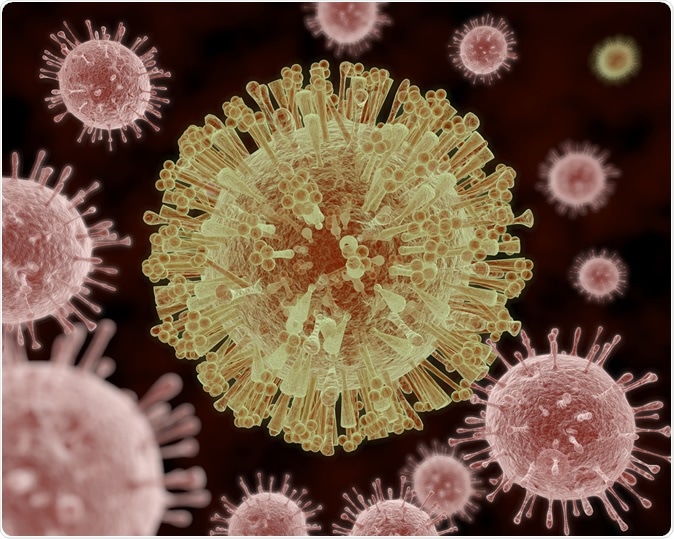The Zika virus has finally wormed its way into one of the largest and most densely populated countries in the world, India. The World Health Organization reported that surveillance efforts should be strengthened here in order to curb the menace and prevent its spread.

An illustration of the Zika Virus, which symptoms include mild headaches, maculopapular rash, fever, malaise, conjunctivitis, and arthralgia. Image Credit: AuntSpray / Shutterstock
According to the WHO, on May 15, three confirmed cases of Zika virus infection were reported from the state of Gujrat that lies in the far west of India. These cases were stumbled upon in February and November last year and one was confirmed in January this year said the report. According the statement issued by WHO in their statement on its website, the level of transmission of the virus is low but new cases are likely to occur in near future and surveillance needs to be strengthened. WHO says that the global risk assessment remains “unchanged” and the virus has been detected in the South-East Asia Region.
Zika in its most recent outbreak affected Brazil in 2015. It is a mosquito-borne disease that spread rapidly worldwide after its initial epicenter in Brazil. It is spread by the Aedes aegypti mosquito that is also responsible for spread of other viral infections such as dengue and chikungunya, both of which are widely prevalent all over India. The virus is also sexually transmitted apart from being transmitted by infected mosquito bites. This virus affects all and sundry but is particularly dangerous for pregnant women. In these women, the virus leads to multiple debilitating birth defects, notable of which is microcephaly, or abnormally small head of the baby that leads to severe mental retardation among other life threatening problems. Zika virus infection is said to have led to these severe birth defects in almost 30 countries over the past few years.
The first official reports of Zika virus infection came from Nigeria in 1953. Even then, researchers had found that the virus exposure among Indians is not rare. Of the 196 persons who were tested for the virus, 33 were found to have developed immunity to it. This means they may have been exposed to the virus before and their body recognized the virus. Now after six decades two women, aged 22 and 34, and a 64-year-old man in India have been confirmed to have the viral infection.
Of these three patients, the 34 year old woman was pregnant and she delivered a baby with normal clinical presentation on 9 November 2016. The 22 year old woman was also at her 37th week of gestation when she was detected with the virus. She also proceeded to deliver a clinically healthy baby. The 64 year old man recovered from the infection with no complications. These three confirmed cases have never travelled outside the country according to reports.
In order to prevent unnecessary panic among general public, the whole matter was kept under close watch and was not publicized. The number of cases also did not rise to cause alarm. However several independent public health professionals have expressed concern over not informing the public after these cases were detected. They deemed it unethical to say the least. A more control information and spread of awareness was due according to several leading community health experts.
As of now more than 25 laboratories are gearing up to test for the virus. The kits would be testing for all the three viruses on mosquito samples zika, dengue and chikungunya – simultaneously. These kits have been provided by Centers for Disease Control and Prevention, United States. At present count over 12,647 mosquito samples and 34,000 and counting human samples have been tested for Zika virus. Nearly 500 mosquito samples were collected from the affected area in Ahmedabad (Bapunagar area) from where the three cases were detected. There are 55 sentinel sites that have been set up to check for microcephaly among new borns that could likely be caused by the virus.
Now with the ramped up vigilance and testing, awareness could be raised among the public curbing this worldwide menace which still is a threat despite being declared as “no longer an emergency” by the WHO.